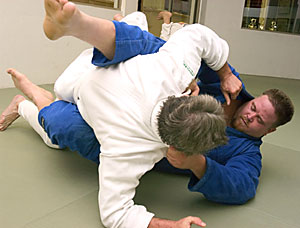 |
|
WILL SEBERGER/Arizona Daily Wildcat
|
Dusty Alexander, an educational psychology graduate student, wrestles with a Jiu-Jitsu student in his studio on Thursday. Alexander is currently ranked third in the world after a tournament in Brazil this summer.
|
|
|
By Kylee Dawson
Arizona Daily Wildcat
Monday, August 23, 2004
Print this
Weeks before the Olympics kicked off, UA student Dusty Alexander brought home a bronze metal from the 2004 International jiu-jitsu World Championship in Brazil.
Alexander, along with over 1,500 other participants, battled it out in Rio de Janeiro, July 22 - 25.
Alexander, an educational psychology graduate student, won the bronze medal in the super-super- heavyweight blue belt division as part of Tucson's Ultima Martial Arts Center team.
"This is straight-up, anything goes fighting for Brazil," Alexander said, describing Brazilian jiu-jitsu.
Alexander, a Tucson native, began studying Brazilian jiu-jitsu more than a year ago after sustaining a football injury.
When he realized Brazilian jiu-jitsu did not aggravate his injury, and noticed everyone from six-year-olds to 70-year-olds practicing it, he realized it was a sport that could be practiced over a lifetime.
UA alumnus and Brazil native Richard Bueno, Alexander's instructor, also competed in the event in the lightweight division.
But both men faced challenges during the competition.
After beating three Brazil natives, Alexander had to compete against Brazilian William Gilvano, who beat Alexander.
According to Alexander and Bueno, Gilvano tried very hard to avoid fighting Alexander properly.
"The guy didn't want to go to the ground with Dusty," Bueno said. "That's jiu-jitsu: ground fighting. I guess he saw Dusty fighting and knew what Dusty's capabilities were, so he just stood up all the time."
Even though standing is legal, jiu-jitsu is supposed to be fought on the ground.
Bueno also said that Gilvano might have had a background in judo because he used judo techniques, such as stand up and takedowns, which gave him an advantage.
"This guy was like 370 (pounds), 6 feet 5 inches; he's a fatty," Alexander said. "He knew that if I had taken him down, he never would have gotten up."
Alexander and Bueno said that Alexander did not get thrown or taken down by Gilvano. Alexander lost the match because he lost his balance.
"It was an attempted throw," Alexander said. "He got my feet off the ground but he didn't throw me."
Bueno also experienced difficulties at the championship. During training, Bueno noticed that he was having difficulty breathing and felt light-headed.
"I was wrestling and then after a couple of minutes I would be gasping for air like I couldn't breathe," Bueno said.
After the championship, Bueno went to a doctor in Brazil and found out that he had a respiratory infection, which could have been caused by a flu or cold.
After taking the prescribed antibiotics, Bueno said his wrestling is back to what it used to be.
While training, Bueno also experienced severe joint pain, particularly in his hips. Because Bueno has been continuously training since February, his doctor said training too hard probably caused the pain.
"There's no excuse for the tournament itself, but I know I could have done 20,000 times better," Bueno said.
Before participating in the world championship, Alexander won gold and Bueno won silver at the 10th Pan American Brazilian jiu-jitsu Tournament in Los Angeles last April.
Participants in the International jiu-jitsu World Championship represented over a dozen countries, including Japan, Australia, South Africa, Spain, France, Canada and the United Kingdom.
For more information about learning jiu-jitsu and other martial arts, check out the Ultima Martial Arts Centers on 6781 N. Thornydale Road #219 and 7649 E. Speedway Blvd or visit the International Brazilian Jiu-Jitsu Federation at www.cbjj.com.br/english.
